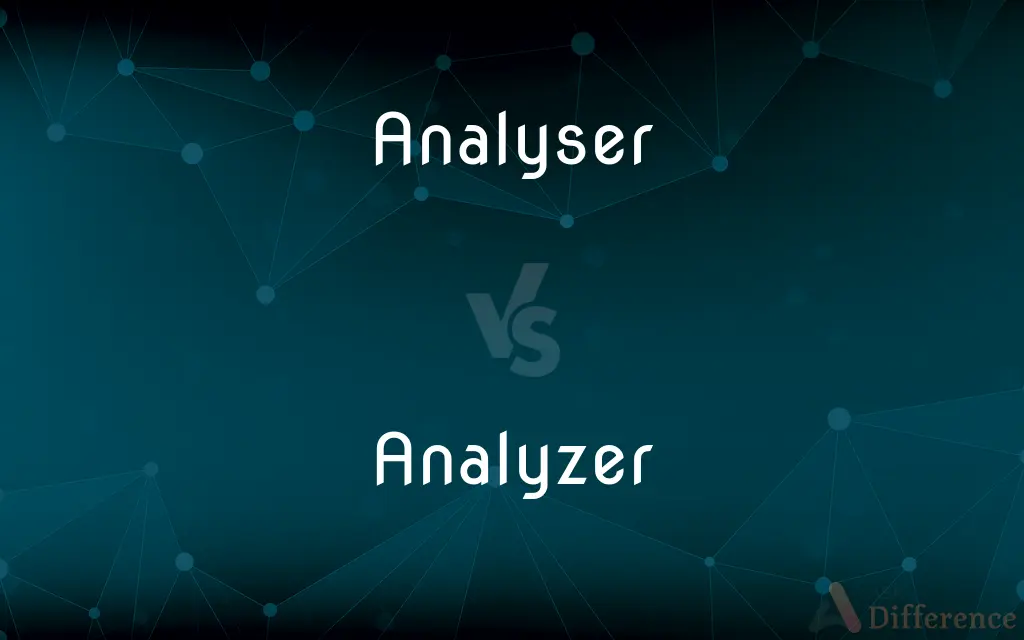Analyser vs. Analyzer — What's the Difference?
By Maham Liaqat & Urooj Arif — Updated on March 3, 2024
Analyser is the British spelling, focusing on chemical or technical analysis, while Analyzer is the American variant, used similarly in contexts of analysis.

Difference Between Analyser and Analyzer
Table of Contents
ADVERTISEMENT
Key Differences
Analyser is the British English spelling of a noun that refers to a person or device that analyses or performs analysis, especially in scientific or technical contexts. It is commonly used in the UK, and other countries following British English norms, in fields such as chemistry, medicine, and technology, where precise analysis is crucial. On the other hand, Analyzer is the American English spelling of the same term. It is predominantly used in the United States and countries that follow American English conventions. This term also refers to devices or individuals that carry out analysis, often found in the same technical and scientific fields as its British counterpart.
While "analyser" might be found in academic journals, research papers, and documentation within countries that use British English, "analyzer" appears in American publications and technical manuals. This difference in spelling reflects the broader divergence between British and American English, which includes not only vocabulary but also grammar and spelling variations. Whereas "analyser" might be used in a sentence like, "The chemical analyser has detected a high concentration of lead," an American might say, "The chemical analyzer has detected a high concentration of lead."
Both terms are understood globally in professional and academic settings, despite their regional spelling differences. The choice between "analyser" and "analyzer" often comes down to the intended audience or the standard practices of the institution or publication. On the other hand, using one variant over the other can sometimes lead to confusion among readers who may not be aware of the spelling differences between British and American English.
As software development and IT, "analyzer" is frequently used regardless of the regional English due to the significant influence of American English in the tech industry. Conversely, "analyser" may still appear in software documentation or interfaces designed by British English speakers or for markets that prefer British spellings.
Students and professionals are taught to maintain consistency in spelling according to the version of English they are using. This means that someone studying in the UK might be encouraged to use "analyser," while someone in the US would be advised to use "analyzer." This consistency is important not only for spelling but also for maintaining the coherence of terminology in technical and scientific communication.
ADVERTISEMENT
Comparison Chart
Spelling
Analyser
Analyzer
Usage Regions
UK, Commonwealth countries
United States
Contexts of Use
Scientific analysis, technical devices
Similar contexts: scientific and technical devices
Example Sentence
E.g., The analyser provided accurate results.
E.g., The analyzer provided accurate results.
Education and Publication
Preferred in British educational systems
Preferred in American educational systems
Compare with Definitions
Analyser
A device used for chemical analysis.
The new analyser can detect trace metals in water.
Analyzer
A software program for data analysis.
This text analyzer can predict trends.
Analyser
A machine for assessing physical properties.
The soil analyser tests for nutrient content.
Analyzer
A machine that automatically analyzes substances.
Our lab's analyzer speeds up testing.
Analyser
A person who conducts detailed examination.
As an analyser, he excels in data interpretation.
Analyzer
Equipment for electrical analysis.
The circuit analyzer can pinpoint faults.
Analyser
Software tool for examining code.
The code analyser helped identify the error.
Analyzer
A tool in quality control processes.
The air quality analyzer monitors pollutants.
Analyser
Component in diagnostic equipment.
The analyser processes samples quickly.
Analyzer
A specialist in analysis work.
The team's analyzer found a critical flaw.
Analyser
An analyser or analyzer is a tool used to analyze data. For example, a gas analyzer tool is used to analyze gases.
Analyzer
To examine methodically by separating into parts and studying their interrelations.
Analyser
(British spelling) analyzer
Analyzer
One who, or that which, analyzes.
Analyser
An instrument that performs analyses.
Analyzer
The part of a polariscope which receives the light after polarization, and exhibits its properties.
Analyser
An instrument that performs analyses
Analyzer
An instrument that performs analyses
Common Curiosities
Is there any difference in meaning between analyser and analyzer?
No, both terms have the same meaning but differ in regional spelling preferences.
Can both spellings be used interchangeably?
While they can be understood interchangeably, usage usually aligns with the regional spelling conventions.
Which spelling should I use in academic writing?
Use the spelling that aligns with the preferred English variant of your institution or publication guidelines.
What is the main difference between analyser and analyzer?
The main difference is spelling: "analyser" is British English, while "analyzer" is American English.
How do I know which spelling to use?
Consider your audience and the standard English variant used in your country or by your publication.
Do analyser and analyzer refer only to devices?
No, they can refer to devices, software, or individuals who perform analysis.
Why do British and American English have different spellings for the same word?
Historical, cultural, and linguistic developments have led to variations in spelling between British and American English.
In software development, which spelling is more common?
"Analyzer" is more common, reflecting the global influence of American English in technology.
Is one spelling more correct than the other?
No, both spellings are correct within their respective variants of English.
Are there any contexts where one spelling is preferred over the other?
Yes, in scientific and technical contexts, the preference aligns with regional English conventions.
Can the spelling affect the understanding of the term?
Generally, no, as the context usually makes the meaning clear, regardless of the spelling.
Do these terms appear in English language tests?
Yes, they might appear, especially in tests assessing knowledge of British vs. American English.
How should businesses choose which spelling to use in their products?
Businesses should consider their target market and the regional spelling preferences of their audience.
Is there a difference in pronunciation between analyser and analyzer?
No, both terms are generally pronounced the same way.
Can using the wrong spelling affect my grades in school?
If your school adheres strictly to a version of English, inconsistent spelling might affect marks for spelling and grammar.
Share Your Discovery

Previous Comparison
Imitate vs. Mimic
Next Comparison
Workplace vs. WorkspaceAuthor Spotlight
Written by
Maham LiaqatCo-written by
Urooj ArifUrooj is a skilled content writer at Ask Difference, known for her exceptional ability to simplify complex topics into engaging and informative content. With a passion for research and a flair for clear, concise writing, she consistently delivers articles that resonate with our diverse audience.













































